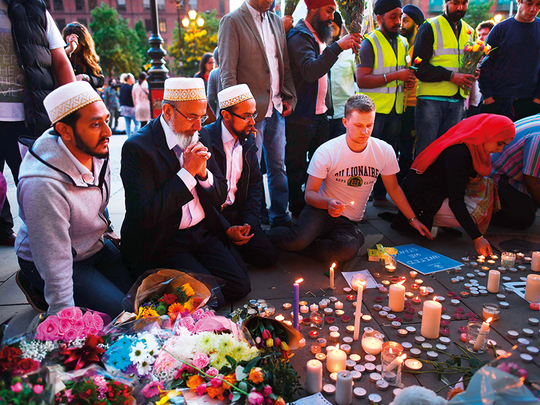
MANCHESTER, UK: Britain’s counterterrorism measures in stadiums, at train stations, airports and other sites are widely considered to be among some of the world’s most sophisticated. Yet they were unable to prevent the most devastating attack on British soil since the London bombings in 2005, leading to questions about what more can be done.
Like Britain, other European countries have significantly stepped up security in recent years, introducing high-tech security hard- and software even for smaller sports or cultural events. But Monday’s attack underscored how attackers can adjust their deadly tactics to even the most sweeping security plans.
“The attack appears to have taken place in the walkway between the stadium and Victoria Station, suggesting that the perpetrator may have felt that the level of security in the stadium itself posed too high a risk to the success of his operation to carry it out inside,” said security analyst Daniel Falkiner.
Other attacks which have occurred in Europe over the last 12 months would also have been hard to prevent. The March car-ramming attack in London was stopped within minutes, but the attacker had already killed several people and injured more than 50. Authorities also say that the Christmas market attack in Berlin last December would have been almost impossible to prevent.
Still, some security experts defend recent efforts as more successful than generally acknowledged.
“The key is … to reduce threat as low as is reasonably practical,” said Sir David Omand, a former director of Britain’s intelligence agency GCHQ who designed large parts of the country’s counterterrorism strategy.
One security measure which has been easy to implement and yet effective, Omand said, was to set up parking spaces further away from event venues to prevent vehicles from coming close to large crowds.
Increasingly, however, European event organisers and authorities also prepare for the worst-case scenario: what happens when an attack is ongoing. British government officials have reached out to owners of shopping malls and other public venues to train staff and to discuss existing security arrangements.
And on the streets of London and elsewhere, the impact of the Manchester concert attack will be immediately evident as Britain’s security threat status was raised to its highest level.
“The number of armed officers has increased, including quick response armed units with military backup if needed, to deal with roving gun attacks,” said Omand.
British Prime Minister Theresa May also announced that soldiers would now also be deployed more frequently across the country and become more present on the streets. It is a significant shift for a country whose strategy has long been based on making counterterrorism measures as invisible as possible. Security barriers around some stadiums, for example, have been turned into artworks to distract from their real purpose.












